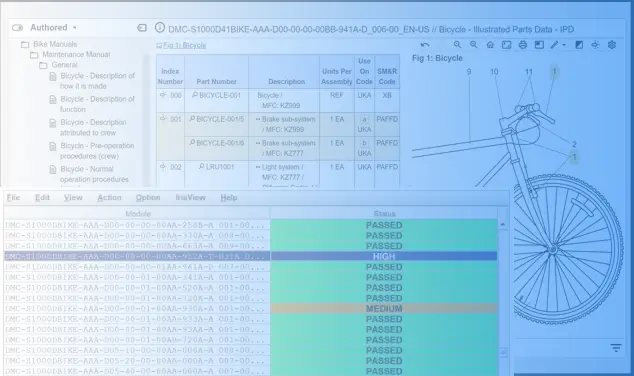Why do I need an S1000D validation tool like IrisCheck?
An S1000D validation tool is an essential component for any organization involved
in the creation and management of technical publications and plays a crucial role in
ensuring consistency and compliance with the S1000D standard. By employing IrisCheck,
organizations can streamline their document authoring processes, enhance data accuracy and consistency,
and ultimately deliver valid, high-quality documentation that meets industry standards.
Read on to explore the key reasons why implementing IrisCheck into your S1000D tool chain is
vital for your organization's success in today's competitive landscape.
Consistency & Compliance
S1000D validation tools play a crucial role in ensuring the accuracy and quality of technical
publications. These tools are specifically designed to check if the content aligns with the S1000D
specification.
By validating content against the defined rules of S1000D, these tools help maintain consistency
throughout the document. They ensure that all required elements are present and properly formatted
according to the standard's guidelines. This not only enhances readability but also improves
comprehension for maintainers and operators who rely on these documents for guidance.
Without using validation tools, inconsistencies can easily creep into technical publications.
Mistakes such as missing or incorrect information, inconsistent formatting, or non-compliance
with specific requirements may occur unnoticed. Such discrepancies can lead to confusion among
end-users who depend on accurate and reliable information from these publications.
Validation helps identify potential errors early in the process, allowing authors and editors
to rectify them before publication. It acts as an essential quality control mechanism by flagging
any deviations from established standards or best practices within S1000D.
Leveraging S1000D validation tools ensures that technical publications adhere closely to industry standards
while maintaining consistency across various documents. By eliminating inconsistencies through rigorous
checks against predefined rule sets, IrisCheck contributes significantly towards producing high-quality
materials that effectively serve their intended purpose - providing clear instructions and valuable
information to operators and maintainers.
Structured Data Format
S1000D content is written in Extensible Markup Language (XML) format, providing a flexible and
standardized way to represent information. XML allows for the structuring of data into elements and
attributes, making it easier to organize and manage content effectively.
One of the key advantages of using XML is its ability to facilitate the exchange of information
between different systems or platforms. By adhering to a structured format, S1000D content can be
seamlessly shared across various software applications without losing any vital data or formatting.
Moreover, XML enables validation tools to ensure that the data conforms to predefined rules and
guidelines. These tools help identify any errors or inconsistencies within the document structure,
ensuring high-quality output that meets industry standards.
By leveraging XML as the foundation for S1000D content creation, businesses can streamline their
documentation processes while maintaining consistency and accuracy throughout their technical publications.
BREX Compliance
Validation tools play a crucial role in ensuring adherence to your business rules and maintaining
proper linking between modules. These tools act as a safeguard, helping you identify any inconsistencies
or errors within the data.
A validation tool is your reliable partner helping to ensure accurate and valid data.
It checks against predefined criteria set by your business rules, so you can rest easy
knowing only accurate and valid information is processed, reducing the risk of incorrect
outputs or faulty decision-making based on flawed data.
Moreover, these tools also help maintain proper linking between different modules
within your system.
They ensure that all connections and dependencies are correctly established, allowing
for seamless
integration across various components of your S1000D publications.
Validation tools provide an essential layer of quality control for businesses by
verifying compliance
with their specific rules. By
leveraging these powerful mechanisms, organizations can enhance accuracy, reliability,
and overall
efficiency in their operations.
Quality Assurance
Validation tools perform quality checks, identifying errors, missing elements, or incorrect
formatting. Ensuring high-quality documentation improves maintainer's and operator's user
experience and reduces support requests.
Efficiency & Cost Savings
Validated content reduces the risk of errors during integration. It streamlines the process
of integrating supplier manuals into the final documentation. Ultimately, this efficiency leads
to cost savings in the production and maintenance of technical publications.
S1000D validation tools are essential for ensuring consistent, compliant, and high-quality
technical documentation. If you work with S1000D data, IrisCheck ensures that the data meets
industry standards.
Take your technical publications to the next level with IrisCheck–ensure
consistency, compliance, and high-quality output for a seamless user experience.
Contact us today for an IrisCheck demo!



